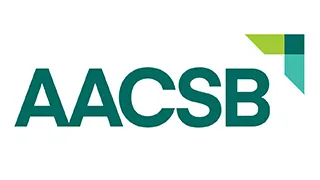About this course
To be competitive in today's digital economy, businesses need to develop a digital strategy. A digital strategy can help organisations effectively manage an ever-increasing range of information systems and organisational resources and analytics capabilities to:
- tap into new sources of data, such as ‘big data’
- produce new insights about their customers or business processes
- design processes and platforms that allow them to share this knowledge among employees
Central to all of this are information systems, i.e., the means or processes by which people and organisations, utilising technologies, create, process, store, use and share management information and organisational knowledge.
The MSc Digital Strategy and Information Systems (DSIS) will enable you to develop in-depth knowledge of the effective development, use and management of information systems in businesses and social organisations.
You’ll learn about the theory and practice of digital strategy and information systems, and examine the technological, managerial and social aspects of the subject.
You’ll learn from academics who underpin their teaching with specialist research and industry knowledge.
We regularly review our courses to ensure and improve quality. This course may be revised as a result of this. Any revision will be balanced against the requirement that the student should receive the educational service expected. Find out why, when, and how we might make changes.
Our courses are regulated in England by the Office for Students (OfS).
Course lead
This course is led by Professor Christophe Mues and Dr PK Senyo.
Learn more about this subject area
Course location
This course is based at Highfield.
Awarding body
This qualification is awarded by the University of Southampton.
Download the Course Description Document
The Course Description Document details your course overview, your course structure and how your course is taught and assessed.
Entry requirements
To apply for this course you’ll need a 2:1 degree from one of the following subjects:
- engineering
- humanities
- business
- mathematics
- physical sciences
- information systems
- management
- social sciences
Find the equivalent international qualifications for your country.
We do not accept the following subjects:
- Language Studies – degrees that focus on learning a language or how to translate, such as 'Business English', 'Applied English', or 'Translation', are not acceptable. However, this restriction does not apply to ‘English’ and ‘English literature’ degrees of the kind taught in the UK.
- Art/Design/Vocational Studies – degrees that focus on learning a particular form of art, craft or vocation. These include degrees in art, graphic design, photography, television broadcasting, script writing, or performance/dance.
English language requirements
If English isn't your first language, you'll need to complete an International English Language Testing System (IELTS) to demonstrate your competence in English. You'll need all of the following scores as a minimum:
IELTS score requirements
- overall score
- 6.5
- reading
- 6.0
- writing
- 6.0
- speaking
- 6.0
- listening
- 6.0
We accept other English language tests. Find out which English language tests we accept.
If you don’t meet the English language requirements, you can achieve the level you need by completing a pre-sessional English programme before you start your course.
Pre-masters
If you don’t meet the academic requirements, you can complete a pre-master's programme through our partnership with OnCampus. Learn more about the programmes available.
Recognition of professional experience
If you don't have the exact entry requirements, but you have significant work experience in this sector we’ll assess your relevant professional experience, your subject knowledge and your aptitude for learning.
Your application will be considered on individual merit and you may be asked to attend an interview.
Got a question?
Please contact us if you're not sure you have the right experience or qualifications to get onto this course.
Email: enquiries@southampton.ac.uk
Tel: +44(0)23 8059 5000
Course structure
This is a full-time master’s course. You’ll study for 12 months, from September to the following September.
In the first 9 months (semesters 1 and 2) you'll study the taught part of your course. The first 2 semesters are made up of modules that everyone on the course takes, and modules we’ll ask you to choose from a list of options.
Compulsory modules teach theoretical and practical concepts in digital strategy and information systems management. They combine the technological, managerial and social topics of the subject.
Optional modules allow you to personalise your learning to suit your interests and career goals. Topics include:
- application of simulation techniques in management
- credit scoring
- advanced analytics
- managing the commercial potential of technological innovation
- project (risk) management
- corporate social responsibility and ethics
For the last 3 months, over the summer, you’ll work independently to research and write your dissertation. You’ll have one-to-one meetings with your supervisor during this time to discuss your progress.
Want more detail? See all the modules in the course.
Modules
The modules outlined provide examples of what you can expect to learn on this degree course based on recent academic teaching. As a research-led University, we undertake a continuous review of our course to ensure quality enhancement and to manage our resources. The precise modules available to you in future years may vary depending on staff availability and research interests, new topics of study, timetabling and student demand. Find out why, when and how we might make changes.
For entry in academic year 2025 to 2026
Year 1 modules
You must study the following modules :
Data Analytics and Organisational Decision Making
This module is intended to provide you with a blend of theory and current practice in organisational decision making and data management. The module critically discusses the complexity of organisational decision making by identifying key concepts and rele...
Digital Business and Human-Computer Interaction
The first part of this module aims to provide you with some insight into the complexity and diversity of human interaction with technology and user centred design – but it is not simply about computers! Every day we interact with a wide variety of system...
Dissertation (DSIS)
The dissertation stage of your Postgraduate programme involves an extended, independent investigation of a topic of your own choosing and the preparation of a 15,000 word dissertation describing your work. You will be supported through supervision meetin...
Information Systems Management and Strategy
The purpose of this module is to equip students with a useful grounding in digital strategy and information systems (IS) management. After introducing the characteristics and concepts of systems and IS, the module will provide an overview of strategic pl...
Information Systems and Digital Technologies
The module aims to introduce you to the fields of information systems and the digital aspects of management in contemporary organisations. You will be introduced to the key definitions and conceptualisations of information systems. The distinction b...
Managing Complexity, Uncertainty and Subjectivity
This module addresses the inter-related activities of defining, developing, exploring and working with ill-structured organisational problems. Such activities are often classed as problem structuring activities, and they can be contrasted with activities...
Managing Digital Design and Web Development
In today’s IT and digital marketing landscape, and with the growing popularity of cloud computing, web and mobile applications are often the technologies of choice for organisations to deliver content and services, either externally or internally. The ai...
You must also choose from the following modules :
Advanced Analytics
Having learnt the basic techniques and principles of business analytics in semester 1 modules, this module will introduce you to a number of advanced applications of business analytics in practice. These include data management using database engines, GLM...
Credit Risk & Data Analytics
The module will start by defining the concept of data analytics and demonstrating the processes in three steps: data pre-processing, data mining and post-processing. Next, we will zoom into the data mining step and distinguish three types of data mining:...
Innovation and Technology Transfer
The UK government has recognised the importance of innovation and technology transfer in sustaining competitive advantage in the global knowledge economy. If successful innovation management is to take place, it is necessary to recognise when technology ...
International Corporate Social Responsibility and Ethics
This module gives an overview of moral philosophy and shows how such ethical theories apply in a business context. This module also covers the development of the concept and the meaning of the terms ‘corporate social responsibility’ (CSR) in a business co...
Project Management
The global and rapid growth of managing by projects in every sector, industry, and company type has led to the development of pan-sector theories and bodies of knowledge in project management. The specific nature of projects as temporary and unique activi...
Project Risk Management
Project risk management has evolved significantly over many years, but there are conflicting views about what constitutes best practice. This course provides an overview of best practice as outlined in the course text with a critical comparison of alterna...
Simulation
This module provides a practical introduction to the theories and techniques of simulation. The approach taken is very broad and covers different forms of simulation, including discrete event simulation, system dynamics and agent-based modelling. The mod...
Learning and assessment
Learning
You’ll learn in an open, informal environment, where you will have an opportunity to regularly speak with academics.
This course is delivered through a mix of lectures, seminars, computer workshops and independent study.
You’ll also learn interactively, through group exercises and discussions, with your lecturers using real-world scenarios and current research to develop your skills.
The type of group exercises you will undertake include reading a research paper and addressing a series of questions in a group and presenting your findings.
You’ll learn practical computing skills using industry-standard software packages to extract insights from customer data, and basic web programming.
Guest industry speakers may deliver talks on relevant issues.
Assessment
Assessment methods vary from module to module, these will include:
- exams
- coursework
- group assignments
On some modules you’ll be marked for practical work. For example, our digital design and web development module will be assessed based on a business proposal for a new website or app and a practical web design or coding assignment. This simulates a real-world consultancy process.
Dissertation
As part of this course, you’ll complete a 15,000 word dissertation project on a topic of your choice. It is an opportunity to deepen your knowledge in a specific area to help you achieve your career ambitions.
Previous students studied a wide variety of topics, for example:
- technostress and the dark side of technology
- the concept of ‘connected cars’ as part of the internet of things
- cloud computing
- challenges/opportunities of artificial intelligence
- information security
- issues relating to online privacy
Academic Support
You’ll have access to a range of support services within Southampton Business School and the wider University.
Every student is allocated a personal academic tutor who will advise on course-related matters or direct you to other types of support.
Careers and employability
Employability skills
This degree will allow you to develop and evidence subject-specific and targeted employability skills. This includes the required skill set for a range of future careers, further study, or starting your own business.
The skills you can expect to focus on and gain from this course include:
- Research
- Critical thinking
- Commercial awareness
- Confidence
- Communication
- Problem solving
The employability and enterprise skills you'll gain from this course are reflected in the Southampton skills model. When you join us you'll be able to use our skills model to track, plan, and benefit your career development and progress.
Download skills overview
Career pathways
Graduates commonly work in a range of organisations or sectors including:
Consultancy,
Technology,
Business,
Public Sector,
Finance.
- Market researcher
- Management consultant
- Financial analyst
- Business analyst
- Quantitative analyst
- Business adviser
- Business development manager
- Data analyst
- Risk manager
- Supply chain manager
- Financial manager
- Marketing executive
- Business adviser
- Quantity surveyor
- Policy officer
- Financial risk analyst
- Investment analyst
- External auditor
- Project manager
- Software engineer
- Business analyst
- Engineer
- Junior Digital marketing executive
- Junior IT consultant
- Product manager Assistant
- Security officer
- Software designer
Job prospects for MSc Digital Strategy and Information Systems graduates
*Example graduate job titles and job prospect statistics taken from The Graduate Outcomes Survey, which gathers information about the activities and perspectives of graduates 15 months after finishing their course.

Work experience opportunities
Choosing to do work experience is a great way to enhance your employability, build valuable networks, and evidence your potential. Learn about the different work and industry experience options at Southampton.
Careers services and support
We are a top 20 UK university for employability (QS Graduate Employability Rankings 2022). Our Careers, Employability and Student Enterprise team will support you. This support includes:
- work experience schemes
- CV and interview skills and workshops
- networking events
- careers fairs attended by top employers
- a wealth of volunteering opportunities
- study abroad and summer school opportunities
We have a vibrant entrepreneurship culture and our dedicated start-up supporter, Futureworlds, is open to every student.
Your career ideas and graduate job opportunities may change while you're at university. So it is important to take time to regularly reflect on your goals, speak to people in industry and seek advice and up-to-date information from Careers, Employability and Student Enterprise professionals at the University.
Fees, costs and funding
Tuition fees
Fees for a year's study:
- UK students pay £15,800.
- EU and international students pay £31,500.
Deposit
If you're an international student on a full-time course, we'll ask you to pay £2,000 of your tuition fees in advance, as a deposit.
Your offer letter will tell you when this should be paid and provide full terms and conditions.
Find out about exemptions, refunds and how to pay your deposit on our tuition fees for overseas students page.
What your fees pay for
Your tuition fee covers the full cost of tuition and any exams. The fee you pay will remain the same each year from when you start studying this course. This includes if you suspend and return.
Find out how to pay your tuition fees.
Accommodation and living costs, such as travel and food, are not included in your tuition fees. There may also be extra costs for retake and professional exams.
Explore:
10% alumni discount
If you’re a graduate of the University of Southampton, you could be eligible for a 10% discount on your postgraduate tuition fees.
Postgraduate Master’s Loans (UK nationals only)
This can help with course fees and living costs while you study a postgraduate master's course. Find out if you're eligible.
Southampton Business School Postgraduate UK Scholarship
A scholarship is available to home fee paying students studying an eligible postgraduate master's at Southampton Business School.
Find out more about the Southampton Business School Postgraduate UK Scholarship, including eligibility and conditions.
Southampton Business School Deans Postgraduate Scholarship
A scholarship of £9,000 is available to international students studying for an eligible postgraduate master’s at Southampton Business School.
Find out more about the Southampton Business School Deans Postgraduate Scholarship, including eligibility and conditions.
Southampton Business School Postgraduate International Scholarship
A scholarship is available to international students studying for an eligible postgraduate master’s at the Southampton Business School.
Find out more about the Southampton Business School Postgraduate International Scholarship, including eligibility and conditions.
Other postgraduate funding options
A variety of additional funding options may be available to help you pay for your master’s study. Both from the University and other organisations.
Funding for EU and international students
Find out about funding you could get as an international student.
How to apply
- Use the blue 'apply for this course' button on this page to take you to our postgraduate admissions system.
- Create an account which gives you access to your own application portal. .
- Search for the course you want to apply for.
- Complete the application form and upload any supporting documents.
- Pay the £50 application assessment fee, (there are some exemptions, check terms and conditions).
- Submit your application.
For further details of our admission process, read our step by step guide to postgraduate taught applications.
Application deadlines
UK students
The deadline to apply for this course is Tuesday 9 September 2025, midday UK time.
We advise applying early as applications may close before the expected deadline if places are filled.
International students
The deadline to apply for this course is Tuesday 26 August 2025, midday UK time.
We advise applying early as applications may close before the expected deadline if places are filled.
Application assessment fee
We’ll ask you to pay a £50 application assessment fee if you’re applying for a postgraduate taught course.
This is an extra one-off charge which is separate to your tuition fees and is payable per application. It covers the work and time it takes us to assess your application. You’ll be prompted to pay when you submit your application which won’t progress until you've paid.
If you're a current or former University of Southampton student, or if you’re applying for certain scholarships, you will not need to pay the fee. PGCE applications through GOV.UK and Master of Research (MRes) degree applications are also exempt. Find out if you’re exempt on our terms and conditions page.
Supporting information
When you apply you’ll need to submit a personal statement explaining why you want to take the course.
You’ll need to include information about:
- your knowledge of the subject area
- why you want to study a postgraduate qualification in this course
- how you intend to use your qualification
References are not required for this programme.
Please include the required paperwork showing your first degree and your IELTS English language test score (if you are a non-native English speaker) with your application. Without these, your application may be delayed.
What happens after you apply
You'll be able to track your application through our online Applicant Record System.
We receive a high volume of applications for this course. This means you may not receive a response to your application for up to 12 weeks.
If we offer you a place, you will need to accept the offer within 30 working days. If you do not meet this deadline, we will offer your place to another applicant.
Unfortunately, due to number of applications we receive, we may not be able to give you specific feedback on your application if you are unsuccessful.
Equality and diversity
We treat and select everyone in line with our Equality and Diversity Statement.
Got a question?
Please contact us if you're not sure you have the right experience or qualifications to get onto this course.
Email: enquiries@southampton.ac.uk
Tel: +44(0)23 8059 5000
Related courses

Accounting and Finance

Accounting and Management

Business Analytics and Finance

Business and Heritage Management

Business Strategy and Innovation Management

Digital Business

Digital Marketing

Finance

Finance and Econometrics

Finance and Economics

Human Resource Management

International Accounting and Governance

International Accounting and Sustainability

International Banking and Financial Studies

International Entrepreneurship and Management

International Financial Markets

International Management

Logistics and Supply Chain Analytics

Management

Management and Artificial Intelligence

Marketing Analytics

Marketing Management

MBA Master of Business Administration

Operational Research

Operational Research and Finance

Project Management

Risk and Finance

Risk Management

Shipping Finance

Strategic Operations and Supply Chain Management



